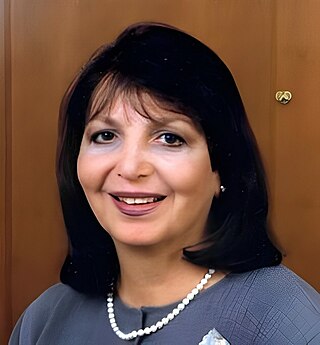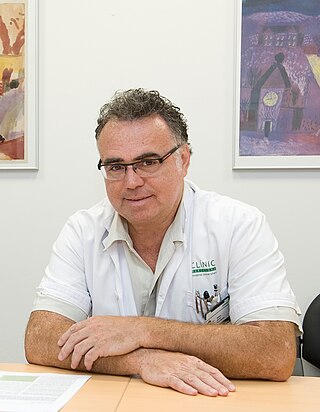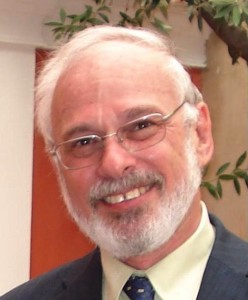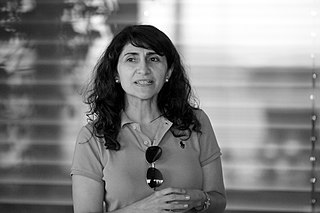Related Research Articles
Neuropsychopharmacology, an interdisciplinary science related to psychopharmacology and fundamental neuroscience, is the study of the neural mechanisms that drugs act upon to influence behavior. It entails research of mechanisms of neuropathology, pharmacodynamics, psychiatric illness, and states of consciousness. These studies are instigated at the detailed level involving neurotransmission/receptor activity, bio-chemical processes, and neural circuitry. Neuropsychopharmacology supersedes psychopharmacology in the areas of "how" and "why", and additionally addresses other issues of brain function. Accordingly, the clinical aspect of the field includes psychiatric (psychoactive) as well as neurologic (non-psychoactive) pharmacology-based treatments. Developments in neuropsychopharmacology may directly impact the studies of anxiety disorders, affective disorders, psychotic disorders, degenerative disorders, eating behavior, and sleep behavior.
George K. Aghajanian was an American psychiatrist who was Emeritus Foundations Fund Professor at the Yale School of Medicine, New Haven, Connecticut, in the Department of Psychiatry. He was a pioneer in the area of neuropharmacology. He also served as a member of the NARSAD Scientific Advisory Board.

George F. Koob is a Professor and former Chair of the Committee on the Neurobiology of Addictive Disorders at the Scripps Research Institute and Adjunct Professor of Psychology, Psychiatry, and Skaggs School of Pharmacy and Pharmaceutical Sciences at the University of California, San Diego. In 2014 he became the director of the National Institute on Alcohol Abuse and Alcoholism.

Patricia Goldman-Rakic was an American professor of neuroscience, neurology, psychiatry and psychology at Yale University School of Medicine. She pioneered multidisciplinary research of the prefrontal cortex and working memory.
A serenic, or antiaggressive agent, is a type of drug which reduces the capacity for irritability and aggression.
The European College of Neuropsychopharmacology (ECNP) is a pan-European, non-profit scientific association that serves as a platform to exchange and promote research in the field of neuropsychopharmacology. The ECNP “is committed to ensuring that advances in the understanding of brain function and human behaviour are translated into better treatments and enhanced public health”. The ECNP organises a number of activities to achieve this aim, such as a yearly congress, workshops, seminars, New Frontiers Meetings, publications, awards, supported talks and much more.

Huda Akil is a Syrian–American neuroscientist whose pioneering research has contributed to the understanding of the neurobiology of emotions, including pain, anxiety, depression, and substance abuse. Akil and colleagues are best known for providing the first physiological evidence for a role of endorphins in the brain and demonstrating that endorphins are activated by stress and can cause pain inhibition.
Celso Arango is a psychiatrist who has worked as a clinician, researcher, and educator in psychiatry and mental health, notably in the field of child and adolescent psychiatry, psychosis, and mental health promotion.
Michael J. Kuhar, is an American neuroscientist, author, and Candler Professor of Neuropharmacology at The Emory National Primate Research Center of Emory University. He is a Georgia Research Alliance eminent scholar, and a senior fellow in the Center for Ethics at Emory. He was previously a professor at Johns Hopkins University School of Medicine and branchchief at the National Institute on Drug Abuse.

Yasmin Hurd is the Ward-Coleman Chair of Translational Neuroscience and the Director of the Addiction Institute at Mount Sinai. Hurd holds appointments as faculty of Neuroscience, Psychiatry, Pharmacology and Systems Therapeutics at the Icahn School of Medicine at Mount Sinai in New York City and is globally recognized for her translational research on the underlying neurobiology of substance use disorders and comorbid psychiatric disorders. Hurd's research on the transgenerational effects of early cannabis exposure on the developing brain and behavior and on the therapeutic properties of cannabidiol has garnered substantial media attention. In 2017, Dr. Hurd was elected to the National Academy of Medicine and, in 2022, Dr. Hurd was elected to the National Academy of Sciences (NAS).

Eduard Vieta Pascual is a Spanish psychiatrist and a leading scientific authority on the neurobiology and treatment of bipolar disorder.

Jee Hyun Kim is an Australian behavioral neuroscientist whose work focuses on emotional learning and memory during childhood and adolescence. She is a professor, ARC future fellow, and head of the Molecular Psychiatry Laboratory at the Deakin University School of Medicine, Australia

Prof. Robert Haim Belmaker, is an Israeli psychiatrist who has had major academic positions in Israeli psychiatry since 1974. He had a formative influence on biological directions in Israeli psychiatry. He was Hoffer-Vickar Professor of Psychiatry at Ben-Gurion University of the Negev, Beersheva Israel until his retirement and is now Emeritus.

Anna V. Molofsky is an American psychiatrist and glial biologist. She is an associate professor in the department of psychiatry at UC San Francisco. Her lab currently studies the communication between astrocytes, microglia, and neurons to understand how these signals regulate synaptic development in health and disease.

Sheena Josselyn is a Canadian neuroscientist and a full professor of psychology and physiology at Hospital for Sick Children and The University of Toronto. Josselyn studies the neural basis of memory, specifically how the brain forms and stores memories in rodent models. She has made critical contributions to the field of Neuronal Memory Allocation and the study of engrams.

Bita Moghaddam is an Iranian-American neuroscientist and author. She is currently the Ruth Matarazzo Professor of Behavioral Neuroscience at Oregon Health & Science University. Moghaddam investigates the neuronal processes underlying emotion and cognition as a first step to designing strategies to treat and prevent brain illnesses.
Lisa M. Monteggia is an American neuroscientist who is a Professor in the Department of Pharmacology, Psychiatry & Psychology as well as the Barlow Family Director of the Vanderbilt Brain Institute at Vanderbilt University in Nashville, Tennessee. Monteggia probes the molecular mechanisms underlying psychiatric disorders and has made critical discoveries about the role of the neurotrophins in antidepressant efficacy, the antidepressant mechanisms of Ketamine, as well as the epigenetic regulation of synaptic transmission by MeCP2.
Marina Elizabeth Wolf is an American neuroscientist and Professor of Behavioral Neuroscience at Oregon Health & Science University. Previously she served as Professor and Chair of the Department of Neuroscience in the Chicago Medical School at Rosalind Franklin University of Medicine and Science. She has been a pioneer in studying the role of neuronal plasticity in drug addiction. Her laboratory is particularly interested in understanding why individuals recovering from substance use disorder remain vulnerable to drug craving and relapse even after long periods of abstinence.
Eva King Killam was a research pharmacologist who studied the activity of drugs on the brain and behavior, developing animal models for epilepsy and opiate dependence.
Gabriella Gobbi is an Italo-Canadian psychiatrist and neuroscientist whose research explores novel treatments for mental health disorders. Gobbi is a professor at McGill University's Department of Psychiatry and a Canada Research Chair in Therapeutics for Mental Health.
References
- ↑ "About Us". ACNP. Retrieved 2019-11-14.
- ↑ "Membership FAQs". ACNP. Retrieved 2019-11-14.
- ↑ "Neuropsychopharmacology - 5th Generation of Progress". ACNP. Retrieved 2023-12-29.
- ↑ "Meeting FAQs". ACNP. Retrieved 2019-11-14.
- ↑ "Honorific Awards". ACNP. Retrieved 2019-11-14.
- ↑ "Neuropsychopharmacology". Nature Publishing group.